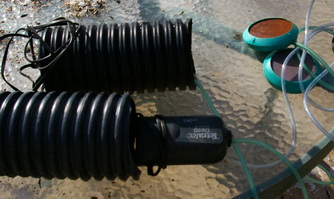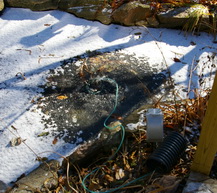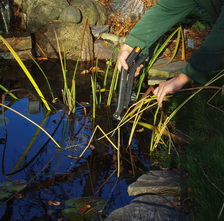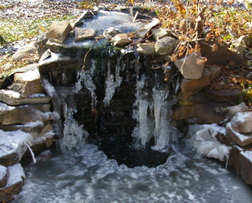|
Overwintering Ponds
|
Take Out? Leave In? This is the lazy gardener’s method so that answer is almost always, leave it in. If it won’t survive the winter in the pond then I won’t have it next year. I did have a large pot of Papyrus that I brought into the house for several years. I liked it. It made a reasonable house plant. It was expensive to replace in the spring. The novelty wore off after a few years and we decided to test it for hardiness. It had none. All of the other plants that I grow in my pond are there because they are hardy and they just stay put all winter. There are one or two plants that sit in my connecting rivers that would be completely out of the water and exposed over the winter and those get buried, pot and all, in the trial bed. I lost my first Lotus after one year and then replaced it this past summer and because it is supposed to be hardy we will be testing that theory this winter, 2008-9.

How Much Ice? My ponds freeze over completely, if I let them, to a depth of several cm. The cat, I don’t know why, walks on them but I have been clever enough not to test them. I have been unable to break holes through the ice by the middle of most winters. They do not however freeze to the bottom. For overwintering ponds. I try to keep an air hole open by putting an air bubbler in each of the ponds. It’s nothing fancy just a deep water air pump from the pond or aquarium store and a good sized air stone. The stream of bubbles rising to the surface will keep a small opening in the ice through all but the most extended deep cold weather. That’s when you can see me with broom handle or something trying to maintain that opening.
 Why Bother? Two reasons. The birds really enjoy the open water near their feeders during the winter and I like to believe that the survival rate of my fish is increased by the steady oxygenation of their water. I have had winters where one of the bubblers died mid-winter and the fish survival did not seem overly affected. When overwintering ponds it is possible to purchase floating heaters that will always keep the pond open. Check out the amount of electricity they use on a daily basis, compare that to the possible cost of replacing your fish in the spring and make your decision. I have only inexpensive Goldfish in my ponds and no heaters.
Why Bother? Two reasons. The birds really enjoy the open water near their feeders during the winter and I like to believe that the survival rate of my fish is increased by the steady oxygenation of their water. I have had winters where one of the bubblers died mid-winter and the fish survival did not seem overly affected. When overwintering ponds it is possible to purchase floating heaters that will always keep the pond open. Check out the amount of electricity they use on a daily basis, compare that to the possible cost of replacing your fish in the spring and make your decision. I have only inexpensive Goldfish in my ponds and no heaters.

Fall Clean Up All of the plant growth in your pond will wind up at the bottom as sludge. In a natural pond that compost supports plant growth etc but in our ponds it becomes stuff that eventually has to be cleaned out. When seting up my overwintering ponds,I use a pair of long handled pruners to cut off this year’s growth as close to the top of the container as possible. Having all of the lily pads gone from the surface of the pond also makes it a lot easier to skim off the falling leaves.
 When Is Too Late? By late November I try to have the bubblers in the pond and at some point I will eventually realize that the skim of ice on the surface and the pretty icicles on the waterfall are there to stay and I unplug the pump. In years past I used to remove the pump and store it indoors but having been too lazy to get it out on time for the last couple of years, I was pleased to discover that it started up and worked just fine when I plugged it in, in the spring. I’m sure that doesn’t follow the manufacturer’s directions but it seems to work for me.
When Is Too Late? By late November I try to have the bubblers in the pond and at some point I will eventually realize that the skim of ice on the surface and the pretty icicles on the waterfall are there to stay and I unplug the pump. In years past I used to remove the pump and store it indoors but having been too lazy to get it out on time for the last couple of years, I was pleased to discover that it started up and worked just fine when I plugged it in, in the spring. I’m sure that doesn’t follow the manufacturer’s directions but it seems to work for me.
If you are overwintering ponds that are small and shallow and freeze to the bottom then you have a whole different situation to deal with. Dig it deeper next year and save yourself a lot of winterizing chores.
